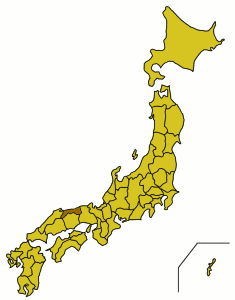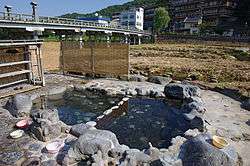Tottori (prefecture)
Tottori Prefecture (鳥取県 Tottori-ken) is in the western Chugoku region of the main Japanese island Honshu.

Understand
Tottori prefecture, together with Shimane prefecture is known as the Sanin region, meaning "the shady side of the mountains". There is a mountain range separating these two prefectures from Hiroshima and Okayama, which means that the weather here is drastically wetter than further to the south.
Cities
- 🌍 Tottori — The prefectural capital known for the Tottori Sand Dunes.
- 🌍 Kurayoshi — A small town with a quaint retro shops and a well-preserved historic district.
- 🌍 Daisen — The city of Daisen is home to Mount Daisen, a famous location for climbing, hiking, and skiing. The famous Daisen-ji Temple is also located on this mountain.
- 🌍 Misasa — Most famous for the Mitokusan Nageiredo, an old temple built on the side of a cliff. Nobody knows exactly how this temple was built, but it is a marvel to behold.
- 🌍 Yurihama — A lovely city containing one of Japan's best Chinese gardens and Lake Togo.
- 🌍 Yonago
- 🌍 Sakai Minato — Westernmost city in Tottori and home of Mizuki Shigeru, creator of Ge Ge Ge no Kitaro
- 🌍 Hokuei — Home to Aoyama World, the museum honoring Gosho Aoyama, the creator of Detective Conan.
Other destinations

Get in
By plane
There are three daily flights from Tokyo's Haneda airport to Tottori airport with ANA. The flight takes about 75 minutes. Tel. 0120-029-222, 0857-23-3038.
By train
JR runs between Okayama and Tottori City, and between Yonago and Matsue and Izumo.
Get around
See
- Hike on Mount Daisen to view the historic Daisenji Temple (Daisen)
- Ride a camel along the Tottori Sand Dunes (Tottori)
- Explore the mysterious Mitokusan Nageiredo (Sanbutsuji Temple) (Misasa)
- Take a walk down the Edo-period storage houses and sake breweries (Kurayoshi)
- Enchoen Garden, an authentic Chinese garden built in China and then reconstructed on site (Yurihama)
- Learn about the world of Japanese yokai with a stroll down Mizuki Shigeru Road (Sakai-Minato)
Do

- Hakuto Beach This beach is written about in the Kojiki, Japan's oldest book of history. (Tottori)
- Mount Daisen Hike on the mountainside, climb up, or ski down the beautiful Fuji of the West (Daisen)
Onsen
- Misasa Onsen One of the most radium-enriched onsen in the world (Misasa)
- Yoshioka Hot Spring Discovered 1,000 years ago. (Tottori)
- Togo Onsen a picturesque onsen on the southern end of Lake Togo (Yurihama)
- Hawai Onsen an onsen on the west side of Lake Togo that gained fame for it's name sounding like Hawaii (Yurihama)
- Kaike Onsen An onsen on the beach (Yonago)
Eat
Local specialties include crab, squid, pears, melons, shallots, and sake.
Drink
Go next
Hyogo Prefecture borders Tottori to the east. Closest to Tottori are Toyooka City with the famous Kinosaki Hot Springs, the remains of Izushi Castle, and the interesting Japan-Mongolia Folk Museum. In Asago you can visit the Takeda Castle Ruins. Although they are ruins, they are well-preserved and the view is great. Further down in Hyogo Prefecture you'll find Himeji, famous for the spectacular Himeji Castle, the port city of Kobe.
Kyoto (prefecture) lies to the east on the other side of Hyogo. Although Kyoto City is rather far, Amanohashidate is quite close and easy to access from Tottori Prefecture. This city is famous as the site of one of Japan's Top 3. It is the view from Amanohashidate that is considered to be one of the top 3 views in Japan.
Okayama Prefecture holds Tottori up from the south. Tsuyama with the famous Kakuzan Park, Shurakuen Garden, and Joto Street is near the eastern region, while Niimi, famous for the Ikura Ravine and Maki Cave is near Western Tottori. Further south, you'll find the Kurashiki with its well-preserved historic district, Okayama which has one of Japan's Top 3, Korakuen Garden, and Takahashi, home to Bitchu Matsuyama Castle, Japan's highest castle, as well as one of it's only remaining original castles.
Shimane Prefecture stands beside Tottori on the Western border. The most famous sites are close to Tottori, so accessing them is quite convenient. Matsue is famous for Matsue Castle, one of Japan's few remaining original castles, and the Lafcadio Hearn Residence. The city of Izumo is home to the spectacular Izumo Shrine, the second most holy Shinto shrine in Japan. The Hinomisaki Lighthouse is also a famous icon of the city. Further out in the prefecture you'll find Tsuwano, where the last Christian martyrs were killed before ending the ban on Christianity and Oda's Iwami Ginzan, a World Heritage Site.